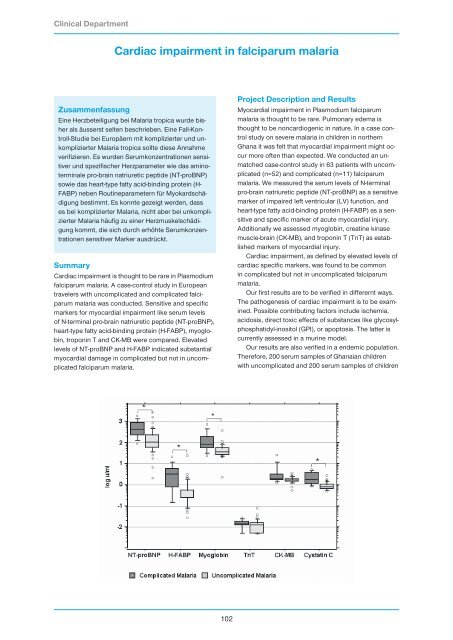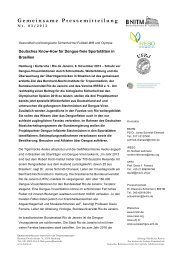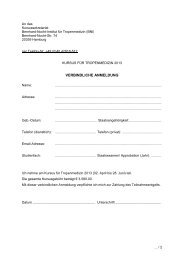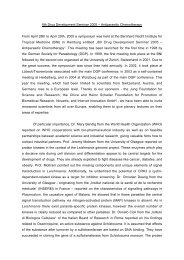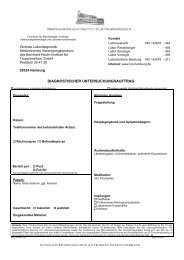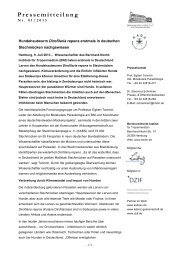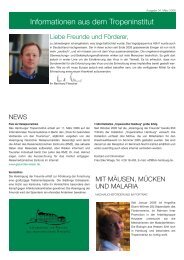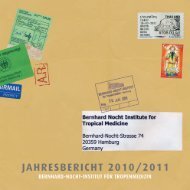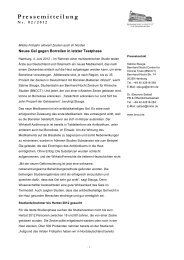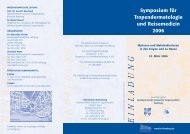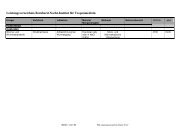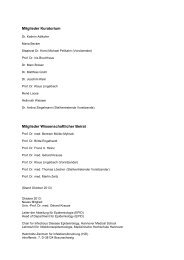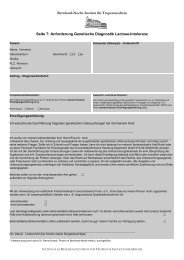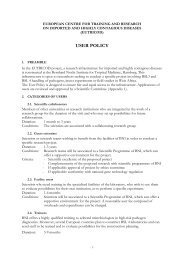Research Group Heussler (Malaria I) - Bernhard-Nocht-Institut für ...
Research Group Heussler (Malaria I) - Bernhard-Nocht-Institut für ...
Research Group Heussler (Malaria I) - Bernhard-Nocht-Institut für ...
You also want an ePaper? Increase the reach of your titles
YUMPU automatically turns print PDFs into web optimized ePapers that Google loves.
Clinical Department<br />
Cardiac impairment in falciparum malaria<br />
Zusammenfassung<br />
Eine Herzbeteiligung bei <strong>Malaria</strong> tropica wurde bisher<br />
als äusserst selten beschrieben. Eine Fall-Kontroll-Studie<br />
bei Europäern mit komplizierter und unkomplizierter<br />
<strong>Malaria</strong> tropica sollte diese Annahme<br />
verifizieren. Es wurden Serumkonzentrationen sensitiver<br />
und spezifischer Herzparameter wie das aminoterminale<br />
pro-brain natriuretic peptide (NT-proBNP)<br />
sowie das heart-type fatty acid-binding protein (H-<br />
FABP) neben Routineparametern <strong>für</strong> Myokardschädigung<br />
bestimmt. Es konnte gezeigt werden, dass<br />
es bei komplizierter <strong>Malaria</strong>, nicht aber bei unkomplizierter<br />
<strong>Malaria</strong> häufig zu einer Herzmuskelschädigung<br />
kommt, die sich durch erhöhte Serumkonzentrationen<br />
sensitiver Marker ausdrückt.<br />
Summary<br />
Cardiac impairment is thought to be rare in Plasmodium<br />
falciparum malaria. A case-control study in European<br />
travelers with uncomplicated and complicated falciparum<br />
malaria was conducted. Sensitive and specific<br />
markers for myocardial impairment like serum levels<br />
of N-terminal pro-brain natriuretic peptide (NT-proBNP),<br />
heart-type fatty acid-binding protein (H-FABP), myoglobin,<br />
troponin T and CK-MB were compared. Elevated<br />
levels of NT-proBNP and H-FABP indicated substantial<br />
myocardial damage in complicated but not in uncomplicated<br />
falciparum malaria.<br />
102<br />
Project Description and Results<br />
Myocardial impairment in Plasmodium falciparum<br />
malaria is thought to be rare. Pulmonary edema is<br />
thought to be noncardiogenic in nature. In a case control<br />
study on severe malaria in children in northern<br />
Ghana it was felt that myocardial impairment might occur<br />
more often than expected. We conducted an unmatched<br />
case-control study in 63 patients with uncomplicated<br />
(n=52) and complicated (n=11) falciparum<br />
malaria. We measured the serum levels of N-terminal<br />
pro-brain natriuretic peptide (NT-proBNP) as a sensitive<br />
marker of impaired left ventricular (LV) function, and<br />
heart-type fatty acid-binding protein (H-FABP) as a sensitive<br />
and specific marker of acute myocardial injury.<br />
Additionally we assessed myoglobin, creatine kinase<br />
muscle-brain (CK-MB), and troponin T (TnT) as established<br />
markers of myocardial injury.<br />
Cardiac impairment, as defined by elevated levels of<br />
cardiac specific markers, was found to be common<br />
in complicated but not in uncomplicated falciparum<br />
malaria.<br />
Our first results are to be verified in differernt ways.<br />
The pathogenesis of cardiac impairment is to be examined.<br />
Possible contributing factors include ischemia,<br />
acidosis, direct toxic effects of substances like glycosylphosphatidyl-inositol<br />
(GPI), or apoptosis. The latter is<br />
currently assessed in a murine model.<br />
Our results are also verified in a endemic population.<br />
Therefore, 200 serum samples of Ghanaian children<br />
with uncomplicated and 200 serum samples of children


